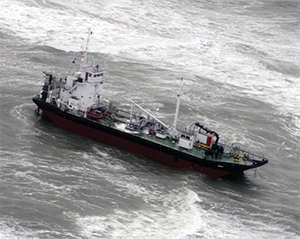A self-propelled bunker barge sailing from Montreal to Mexico ran aground off northeastern Nova Scotia after losing power in one of its engines, and its crew of six had to be rescued by a Canadian Coast Guard helicopter.
The 174-foot Arca 1 grounded on the sandy shore near the Cape Breton Island town of Sydney at about 0800 on Jan. 8. Weather and sea conditions were challenging at the time and the vessel was struggling on one engine.
Pierre Murray, a manager with the Transportation Safety Board of Canada, said it appears the propulsion problem originated in the clutch system. He cautioned that the incident remains under investigation and nothing has been determined.
“They lost power on one prop in the morning and the water wasn’t the best — it was pretty rough weather — and the vessel couldn’t keep going,” Murray said in a recent interview. “They were able to drop anchor, but the anchor didn’t hold and they ended up backing up onto the beach.”
McKeil Marine of Hamilton, Ontario, recently sold Arca 1 to the Mexican oil company Petroil and it was being delivered when the incident occurred. The vessel was in layup for nearly two years before departing for Mexico. It was reflagged from Canada to Panama shortly before departing.
Attempts to reach McKeil Marine for comment were not successful.
The vessel was carrying 9 tons of diesel fuel at the time of the grounding, but there was no oil cargo aboard. No pollution was reported.
Patrice Caron, executive vice president of the Seafarers’ International Union of Canada, said Arca 1 was a fixture in Montreal for many years. It bunkered large ships tied up at the docks and at anchor in the St. Lawrence River.
Caron worked aboard Arca 1 years ago. He said it was designed for sheltered waters and was not suitable for a long oceangoing voyage.
“It was suicidal to me to put people on a barge like that, to let a barge go without an escort in these waters,” he said by telephone. “Simply put, it should have never left the dock without an escort.”
Arca 1 was built in 1963. It has an unusual twin-engine propulsion system resembling outboard motors on recreational boats that can be raised or lowered in the water. The vessel’s horsepower rating could not be confirmed.
“They are quite big, but they are still outboards. That means if water is coming in the stern, the chances are they are going to lose the engines,” Caron said.
Arca 1 left Sorel-Tracy, Quebec, a small city on the St. Lawrence River, on Dec. 31 for its voyage to Mazatlan on Mexico’s Pacific coast. The voyage plan called for multiple stops along the way to refuel and resupply its crew of two Americans and four Canadians.
The vessel lost power in one of its engines before 0400 on Jan. 8, Murray said, but continued toward Sydney. It grounded about three miles north-northwest of the entrance to Sydney Harbor. The exact time of the grounding is not clear, although crew reported it to Canadian authorities at about 0800.
“The shoreline there has a very gradual slope to it. You have to go up quite a ways before you get to deep water, so the vessel was just pushed into the shore,” said Keith Laidlaw, a senior response officer with the Canadian Coast Guard and the Arca 1 incident commander. “The whole area there, even offshore, there are rock outcrops sticking out of the water. The vessel was very fortunate — it was pushed onto shore at the best possible spot it could ground.”
The Canadian Coast Guard and Canadian Department of Defense responded to the stranded vessel on the morning it ran aground. That afternoon, a rescue diver hoisted the crew from the barge into a helicopter due to concerns about the weather.
“The wind and sea states were picking up and it’s easier to get people off a ship than to get them back on,” Laidlaw said. “The captain requested the personnel be taken off.”
For the next week, the Coast Guard worked with the owners to formulate a salvage plan that initially involved pumping seawater out of the vessel. The shallow-draft, 900-hp tugboat Kaliutik was unable to pull Arca 1 off the shore, however, and a larger tug in the area, Tim McKeil, couldn’t get close enough due to its deeper draft. The Canadian firm McKeil Marine owns both tugs.
Authorities resolved the issue by crafting a longer towline, allowing the 4,800-hp Tim McKeil to haul the barge off the shore. Arca 1 was freed on Jan. 15 and Tim McKeil towed it to a Sydney shipyard for repairs.
In addition to the propulsion problems, Murray said the barge was damaged as a result of the grounding. An estimate of the damage was not available.

